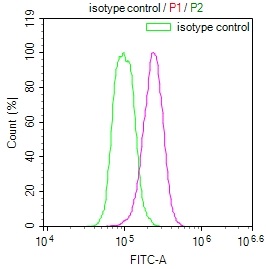PCDH15 Antibody
-
中文名稱:PCDH15兔多克隆抗體
-
貨號:CSB-PA853490ESR1HU
-
規格:¥440
-
圖片:
-
其他:
產品詳情
-
產品名稱:Rabbit anti-Homo sapiens (Human) PCDH15 Polyclonal antibody
-
Uniprot No.:
-
基因名:PCDH15
-
別名:PCDH15 antibody; USH1F antibody; Protocadherin-15 antibody
-
宿主:Rabbit
-
反應種屬:Human
-
免疫原:Recombinant Human Protocadherin-15 protein (160-400AA)
-
免疫原種屬:Homo sapiens (Human)
-
標記方式:Non-conjugated
-
克隆類型:Polyclonal
-
抗體亞型:IgG
-
純化方式:Antigen Affinity Purified
-
濃度:It differs from different batches. Please contact us to confirm it.
-
保存緩沖液:PBS with 0.02% sodium azide, 50% glycerol, pH7.3.
-
產品提供形式:Liquid
-
應用范圍:ELISA, IHC
-
推薦稀釋比:
Application Recommended Dilution IHC 1:20-1:200 -
Protocols:
-
儲存條件:Upon receipt, store at -20°C or -80°C. Avoid repeated freeze.
-
貨期:Basically, we can dispatch the products out in 1-3 working days after receiving your orders. Delivery time maybe differs from different purchasing way or location, please kindly consult your local distributors for specific delivery time.
-
用途:For Research Use Only. Not for use in diagnostic or therapeutic procedures.
相關產品
靶點詳情
-
功能:Calcium-dependent cell-adhesion protein. Essential for maintenance of normal retinal and cochlear function.
-
基因功能參考文獻:
- Novel 4658delT PCDH15 mutation was identified in a family with nonsyndromic hearing loss. PMID: 29692870
- rs2045145 associated with more European female facial profile PMID: 29301965
- We found a remarkable genetic heterogeneity in the studied families with USH1 with a variety of mutations, among which three were novel. These novel mutations will be included in the NADf mutation screening chip that will allow a higher diagnosis efficiency of this extremely genetically heterogeneous disease. PMID: 27440999
- PCDH15 polymorphism is associated with extraversion. PMID: 27918536
- Results present structures of a protocadherin-15 fragment featuring a non-canonical linker region that exhibits increased flexibility without compromising mechanical strength. PMID: 28238533
- This study confirms that genetic variations in PCDH15 modify the susceptibility to noise-induced hearing loss development in humans. PMID: 28292353
- Results uncovered a novel interaction between MYO3A and PCDH15 shedding new light on the function of myosin IIIA at stereocilia tips. PMID: 26841241
- no statistically significant association between any rare, heterozygous PCDH15 point variants and schizophrenia or autism spectrum disorders was found PMID: 27058588
- PCDH15 p.Asp1010Gly variant probably modified the phenotypic expression of the 7511T>C mutation in MT-TS1 PMID: 26279247
- The novel homozygous mutation in a family segregating non-syndromic hearing loss family supports previous reported observations that PCDH15 does not only causes Usher syndrome type 1F, but also DFNB23. PMID: 25930172
- PCDH15 or DFNB59 variants are associated with poor CI performance, yet children with PCDH15 or DFNB59 variants might show clinical features indistinguishable from those of other typical pediatric cochlear implant recipients. PMID: 26166082
- PCDH15 has several alternate cytoplasmic domain exons and differentially spliced isoforms may function redundantly PMID: 25307757
- Genetic variations of PCDH15 and their interactions with occupational noise exposure are associated with genetic susceptibility t onoise-induced hearing loss. PMID: 25462672
- Patients lacking PCDH15-CD2 isoform are profoundly deaf. PMID: 24940003
- Single nucleotide polymorphisms spanning a 9-kb region centered on exon 11 of the protocadherin 15 ( PCDH15 ) gene were found to be associated with irritable bowel syndrome in Australian, United States, and Swedish populations. PMID: 24797007
- Alberta Hutterites with Usher syndrome type I do not carry the exon 10 mutation in the PCDH15 gene. PMID: 22690115
- Seven different point mutations, five novel, were detected in PCDH15 gene in Spanish patients with Usher syndrome type I. PMID: 22815625
- a combination of PCR-based mutation screening, together with deletion and duplication analysis, is mandatory for the accurate screening of the PCDH15 gene in Usher patients. PMID: 20538994
- Study suggests that PCDH15 is associated with lipid abnormalities. PMID: 19816713
- A founder mutation, R245X, of the PCDH15 gene among Ashkenazi Jews is a cause of Type 1 Usher Syndrome. PMID: 12711741
- Here we report that non-syndromic recessive hearing loss (DFNB23) is caused by missense mutations of PCDH15. PMID: 14570705
- characterizeation of a new allele of the protocadherin 15 gene (designatedPcdh15(av-6J); Young Pcdh15(av-6J) mice are unresponsive to auditory stimulation and show circling behavior indicative of vestibular dysfunction PMID: 16887306
- Analysis of three large deletions revealed that all six breakpoints are different. Breakpoint junction was identified in one patient and four other breakpoints were mapped to 4 kb. PMID: 17277737
- Both mouse and human protocadherin 15 genes have complex genomic structures and transcription control mechanisms. PMID: 17706913
- Humans with PCDH15 (USH1F), USH2A or GPR98 (USH2C) had a similar retinal phenotype to MYO7A PMID: 18463160
- study of PCDH15 mutations in nonsyndromic deafness DFNB23 and type 1 Usher syndrome PMID: 18719945
- missense mutations in conserved motifs of PCDH15 cause nonsyndromic hearing loss PMID: 19107147
- One SNP in PCDH15 (rs7095441) and two SNPs in MYH14 (rs667907 and rs588035), resulted in significant associations in the Polish sample set and significant interactions with noise exposure level in the Swedish sample set. PMID: 19183343
- Mutations cause Usher syndrome type 1F. Protocadherins are essential for maintenance of normal retinal and cochlear function. PMID: 11487575
顯示更多
收起更多
-
相關疾病:Usher syndrome 1F (USH1F); Usher syndrome 1D/F (USH1DF); Deafness, autosomal recessive, 23 (DFNB23)
-
亞細胞定位:Cell membrane; Single-pass type I membrane protein.; [Isoform 3]: Secreted.
-
組織特異性:Expressed in brain, lung, kidney, spleen and testis. Found also in the inner and outer synaptic layers, and the nerve fiber layer in adult and fetal retinas. Found in the supporting cells, outer sulcus cells and spiral ganglion of fetal cochlea. Expressed
-
數據庫鏈接:
Most popular with customers
-
-
YWHAB Recombinant Monoclonal Antibody
Applications: ELISA, WB, IHC, IF, FC
Species Reactivity: Human, Mouse, Rat
-
Phospho-YAP1 (S127) Recombinant Monoclonal Antibody
Applications: ELISA, WB, IHC
Species Reactivity: Human
-
-
-
-
-




















